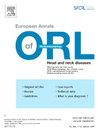头颈部肿瘤手术中的游离皮瓣重建方法:法国 GETTEC 头颈部肿瘤研究小组成员的 CROSS 实践调查。
IF 1.9
4区 医学
Q2 OTORHINOLARYNGOLOGY
European Annals of Otorhinolaryngology-Head and Neck Diseases
Pub Date : 2024-09-01
DOI:10.1016/j.anorl.2024.04.002
引用次数: 0
摘要
目的调查头颈部肿瘤手术后微血管游离瓣重建中抗凝剂和抗血小板的使用情况:方法:在 2022 年 9 月至 2023 年 3 月期间对临床实践进行调查。我们向法国 GETTEC 头颈部肿瘤研究小组的成员发送了一份在线调查问卷,调查对象是法国所有使用微血管游离瓣重建的头颈部肿瘤手术中心。问卷调查了外科医生在术中和术后使用抗凝剂和抗血小板药物、术前合并症管理以及术后并发症预防方面的做法:38名受访者中有61%(23/38)使用术中静脉注射肝素,76%的外科医生(29/38)使用肝素进行皮瓣冲洗,37%的外科医生(14/38)使用肝素溶液浴。95%的外科医生(36/38)使用术后抗凝疗法,40%的外科医生(15/38)使用抗血小板疗法。术后,40%的医生(15/38)使用植入式微型多普勒探头进行监测,并分析皮瓣的临床特征:结论:使用微血管游离皮瓣进行重建手术涉及许多影响成功的因素。前瞻性研究,尤其是有关抗凝剂管理的研究,可以就游离皮瓣重建的方法达成全国共识。本文章由计算机程序翻译,如有差异,请以英文原文为准。
Free-flap reconstruction methods in head-and-neck oncologic surgery: A CROSS practice survey of members of the French GETTEC Head-and-Neck Tumor Study Group
Objective
To survey practices concerning the use of anticoagulants and antiplatelets in microvascular free-flap reconstruction following oncological surgery of the head and neck.
Methods
A survey of practices was carried out between September 2022 and March 2023. An online questionnaire was sent to members of the French GETTEC Head-and-Neck Tumor Study Group in all French centers practicing head-and-neck cancer surgery with reconstruction using microvascular free-flaps. The questionnaire asked surgeons about their practices regarding the use of intra- and postoperative anticoagulants and antiplatelets, preoperative management of comorbidities, and prevention of postoperative complications.
Results
Sixty-one percent of the 38 respondents (23/38) used intraoperative intravenous heparin injection, associated to flap irrigation with heparin for 76% of surgeons (29/38) and/or a heparin solution bath for 37% (14/38). Postoperative anticoagulation was used by 95% of surgeons (36/38), and antiplatelets by 40% (15/38). Postoperatively, 40% (15/38) carried out monitoring using an implantable micro-Doppler probe, associated to analysis of clinical characteristics of the flap.
Conclusion
Reconstructive surgery using microvascular free-flaps involves numerous factors that can influence success. Prospective studies, particularly concerning the management of anticoagulants, could enable a national consensus on methods for free-flap reconstruction.
求助全文
通过发布文献求助,成功后即可免费获取论文全文。
去求助
来源期刊

European Annals of Otorhinolaryngology-Head and Neck Diseases
OTORHINOLARYNGOLOGY-
CiteScore
3.70
自引率
28.00%
发文量
97
审稿时长
12 days
期刊介绍:
European Annals of Oto-rhino-laryngology, Head and Neck diseases heir of one of the oldest otorhinolaryngology journals in Europe is the official organ of the French Society of Otorhinolaryngology (SFORL) and the the International Francophone Society of Otorhinolaryngology (SIFORL). Today six annual issues provide original peer reviewed clinical and research articles, epidemiological studies, new methodological clinical approaches and review articles giving most up-to-date insights in all areas of otology, laryngology rhinology, head and neck surgery. The European Annals also publish the SFORL guidelines and recommendations.The journal is a unique two-armed publication: the European Annals (ANORL) is an English language well referenced online journal (e-only) whereas the Annales Françaises d’ORL (AFORL), mail-order paper and online edition in French language are aimed at the French-speaking community. French language teams must submit their articles in French to the AFORL site.
Federating journal in its field, the European Annals has an Editorial board of experts with international reputation that allow to make an important contribution to communication on new research data and clinical practice by publishing high-quality articles.
 求助内容:
求助内容: 应助结果提醒方式:
应助结果提醒方式:


